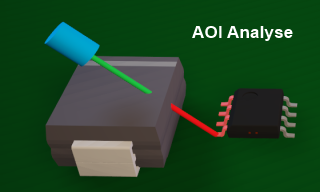
In the development of printed circuit boards, it is not uncommon for weak points in the design to be noticed only during the production process or, for example, during “Automatic Optical Inspection”(AOI). However, additional costs and labor could have been minimized in advance by often making small design changes.
Occasionally, boards even have to be redesigned afterwards or painstakingly checked individually by hand for soldering defects because the AOI inspection camera could not see individual pins and check them for correctness due to other components being placed too close.
In order to minimize or even eliminate this risk and the resulting higher costs, an Automatic Optical Inspection (AOI) simulation was developed. Here, an analysis in 2D as well as in 3D is possible.
In 2D simulation, distances of all pins on the board are measured in their expected test direction to other components.
If another component is located in this direction at too short a distance, this is reported by the system. The distance is calculated taking into account the camera angle.
This ensures that all component pins are visible to the inspection camera during the production process and can therefore be automatically inspected.
In a 3D AOI simulation, any component is checked using its shadows.
For this purpose, shadows corresponding to the shapes of the component are mapped under the inspection directions “vertical” or “horizontal”. If a component or its pins are in this shadow, the inspectability is endangered, whereby this component is marked as possibly not inspectable.
Selected components and their pins are entered in a list with the associated shadow-casting components and can be inspected using this list. The list entries also contain information such as the distances to the shadow-casting components.
By using the AOI analysis available in PCB-Investigator, you can guarantee later testability in good time while the board is still in the design process, thus reducing your production costs!
User guide:
You can find a detailed user manual here.


